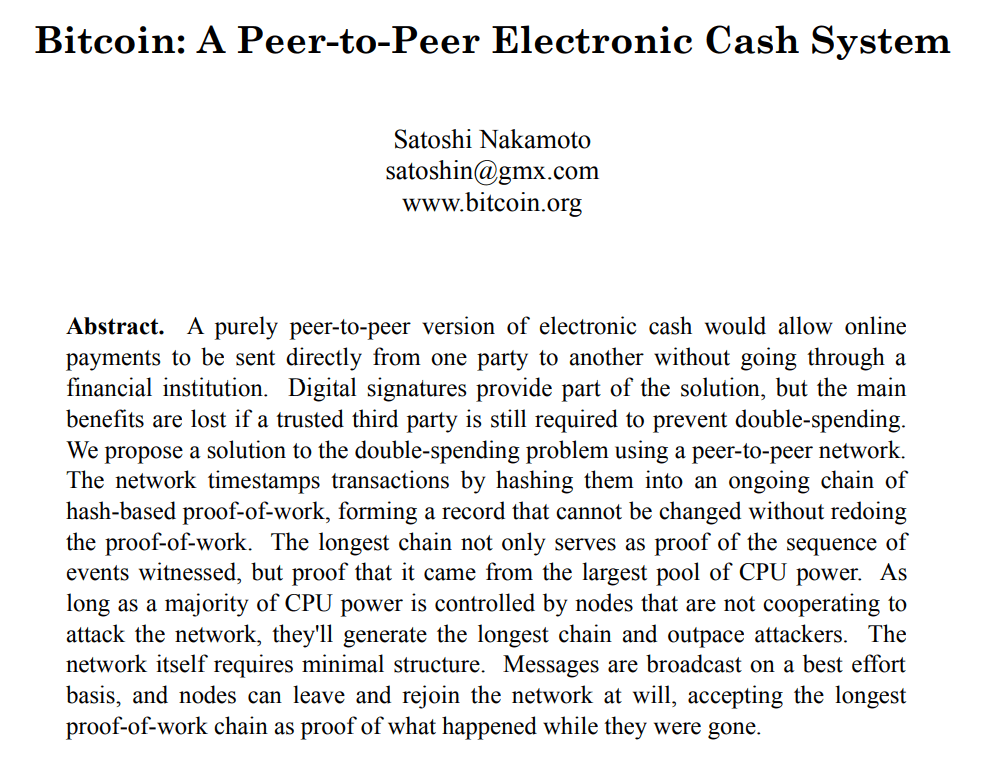Comments
- No comments found

Cryptocurrency (crypto) is full of potential.
It’s also teeming with confusing jargon and grandiose promises that give the most famous of cults a run for their money. Blockchain, DeFi, DAOs, NFTs, Metaverse, and more proliferate the lexicon. To an outsider, crypto can be extraordinarily intimidating. However, below the complex veneer lies a familiar world. Far from revolutionary, crypto (at its best) is mostly evolutionary progressions of commonplace ideas.
I have little doubt that crypto will leave its mark on the world. Where I differ from the evangelists is in its magnitude. I don’t see crypto as a new, momentous movement. Rather, it’s an extension of the industrial revolution emerging from freed human minds of the political shackles of monarchs, emperors, warlords, and witchdoctors. By using technology, crypto more efficiently circumvents the artificially created roadblocks (i.e. regulations) that still plague our lives, hinder innovation, and stifle prosperity. Its impact can be positive, but it’s no silver bullet.
Few things embody overexcitement like Bitcoin today. The OG of crypto purportedly cures every ailment plaguing the modern world. It’s the answer to “Too Big to Fail”, banking the unbanked, fighting financial repression, and is even viewed as a tool for social justice. However, Bitcoin is none of these grand abstractions. Its core function is far more humble. Bitcoin is simply a peer-to-peer electronic payment platform—a “new and improved” Western Union. At its heart, Bitcoin is just a database.

Bitcoin was designed as a peer-to-peer electronic payment system | Source: Bitcoin.org
To be sure, Bitcoin’s decentralized method for recordkeeping is innovative and ingenious. Its blockchain removes counterparty risk and trust from a process where these are critical failure points (i.e. payments). Financial services are notorious for red-tape, stagnation, corruption, and poor customer experiences. Bitcoin aims to solve these problems by circumventing much of the regulations to blame.
The efficient transfer of value among people is as old as human trade. It’s great that Bitcoin aims to improve this function by removing barriers, disintermediating rent-seekers, and improving efficiency. The more trade the better.
However, Bitcoin’s practicality is far from its utopian extrapolations. As groundbreaking as its blockchain may be, Bitcoin is nonetheless a database applied to electronic payments. While it may improve this antiquated process, it’s no financial system cure-all. It cannot fix the political, root causes that Bitcoin’s proponents rightfully wish to address. In fact, I see these issues completely reversed; it’s freedom that unlocks Bitcoin’s potential.
Social tokens are another crypto segment garnering lots of attention. Social tokens are digital assets, like all cryptos, that can be created and distributed by anyone. They are mechanisms for individuals to distribute customizable rights to other people. Decentralized blockchains make it easy to create, administer, manage, and trade social tokens. Thus, they’re catching the attention of content creators looking for innovative ways to monetize their work.
In other words, social tokens give individuals their own currency to exchange for real world value. Instead of paying with money, people can issue their own cryptocurrency. Tokens can be given away or sold. Their creators can then exchange benefits, like access to chat rooms, exclusive content, or even curated gift boxes for their tokens, thus giving their currencies real value.
For example, I could auction off TII Coins (The Integrating Investor Coin) for cash or even issue them to readers who retweet 20 articles. I could then host an exclusive monthly chat room that costs one TII Coin to join. As the website popularity grows, so too might the value of TII Coins thus introducing a speculative quality to them. TII Coin coveters could buy them, earn them, and even transact in secondary markets. The value for me is TII Coin sale income and advertising from higher social media exposure. TII fans receive exclusive benefits or income from earning and selling them to others.
Thus, social tokens are mechanisms to trade value without the explicit use of money. This is hardly a novel development. Corporations readily do this with their equity. They reward employees with grants of stock and options in lieu of raising salaries or paying cash bonuses. Companies also use their stock to acquire others. Company X might purchase Company Y by issuing its owners equity rather than paying the full acquisition price in cash. Social tokens bring this functionality to individuals.
Social tokens have other potential applications as well. They can represent tradeable loyalty points, royalties, collectibles, or any other customizable claim to an asset (tangible or intangible). The blockchain may certainly spawn innovation in and the proliferation of social tokens. However, they are merely expanding familiar functionalities.
Decentralized autonomous organization, or DAOS, are also making headlines today. A DAO is an organization managed by smart contracts maintained on a blockchain. Token holders vote on key organizational decisions traditionally made by management teams. Hence, community consensus rather than hired employees govern DOAs. Decision-making is distributed across dispersed owners.
However, decentralized organizations have existed for nearly two thousand years. We call them joint-stock companies or, more commonly, corporations. Corporations’ distributed owners readily buy and sell their stakes. Shareholders run them and accrue their benefits in the form of changing stock prices and dividends. Given the complexities of shared ownership, owners elect a Board of Directors to represent their interests, determine governance matters, and oversee performance. Hence shareholders, acting through chosen agents, operate the organization. Sound familiar?
To be sure, crypto widens the potential scope of decentralized control for DAOs vis-à-vis modern-day corporations. In theory, token holders can have more direct input into a DAO’s actions thus eliminating the need for elected agents ( i.e. a Board of Directors). However, this may not necessarily be a benefit.
Most organizations, including corporations, implement managerial hierarchies for a reason: efficiency. It can be cumbersome to vote on every issue, especially if time is of the essence. Furthermore, many decisions require specialized knowledge that owners many not necessarily have. Centralized, corporate structures are an application of the division of labor. It allows companies to achieve more. DAOs might be redundant, inefficient, and, ultimately, harmful in some cases.
Ultimately, cryptos are components of the Decentralized Finance (DeFi) ecosystem. DeFi is a vision for a finance industry devoid of banks and other corporate intermediaries. Smart contracts create peer-to-peer financial networks for lending, trading, payments, insurance, and other services. DeFi proponents view today’s financial system as centralized, stagnant, and corrupt. They believe that (only) crypto solutions can improve it.
Ironically, DeFi is recreating fractional reserve banking which it hoped to replace. Fractional reserve banking dates back to the Renaissance in Italy, if not much, much earlier, and was an incredible innovation. Ultimately, it’s a mechanism for money creation through the productive employment of leverage. To be sure, fractional reserve banking’s had its troubles; but overall, it’s an overwhelming benefit.
DeFi protocols such as BlockFi, Aave, Uniswap, and Sushi are literal doppelgängers of modern banks. Holders can deposit crypto with them and earn a yield in return. Borrowers—primarily traders and exchanges these days— can then access these crypto liquidity pools for their own needs (primarily leveraged transactions). This is precisely how traditional banks operate except that DeFi replaces fiat currencies with crypto and bankers with smart contracts. Fundamentally, DeFi protocols are like any other finance company.
Crypto is an incredibly complex and intimidating field to navigate. Nascent technology, obscure terminology, sensational promises, and obnoxious supporters pose formidable barriers to scrutiny. Unfortunately, these must be surmounted in order to seriously invest in crypto.
However, these obstacles can be easily overcome by taking a broader perspective. By and large, crypto is merely iterating upon a familiar slate of financial services. It’s not creating anything new nor solving major social issues as many believe. By using technology, crypto is innovating an otherwise stagnant and stale industry long overdue for an upgrade. In this regard, crypto—in general—is incredibly positive.
On one hand, I’m excited by crypto’s potential; on the other, I’m frustrated by its proponents who make crypto out to be more than it is. Removing crypto’s various ascribed emotional abstractions helps me focus on its concrete utility. Ultimately, it’s crypto’s real-world use that drives its investment value. Thus, calibrating on its evolutionary benefits and ignoring the revolutionary hype should help me assess how I ought to invest in the industry (if even).
Seth Levine is a professional, institutional investor focused on selecting high yield bond positions for a financial services company. He is also the creator of The Integrating Investor where he blogs about macroeconomic and investment strategy related themes. Seth holds a Bachelor of Science degree in Mechanical Engineering from Cornell University and is a CFA charterholder. You can learn more about Seth at www.integratinginvestor.com and follow him on Twitter at @SethLevine2. Please note that any opinions and views he expresses are solely his own and do not reflect those of his current or former employers.
Seth Levine is a professional, institutional investor focused on selecting high yield bond positions for a financial services company. He is also the creator of The Integrating Investor where he blogs about macroeconomic and investment strategy related themes. Seth holds a Bachelor of Science degree in Mechanical Engineering from Cornell University and is a CFA charterholder. You can learn more about Seth at www.integratinginvestor.com and follow him on Twitter at @SethLevine2. Please note that any opinions and views he expresses are solely his own and do not reflect those of his current or former employers.
Leave your comments
Post comment as a guest